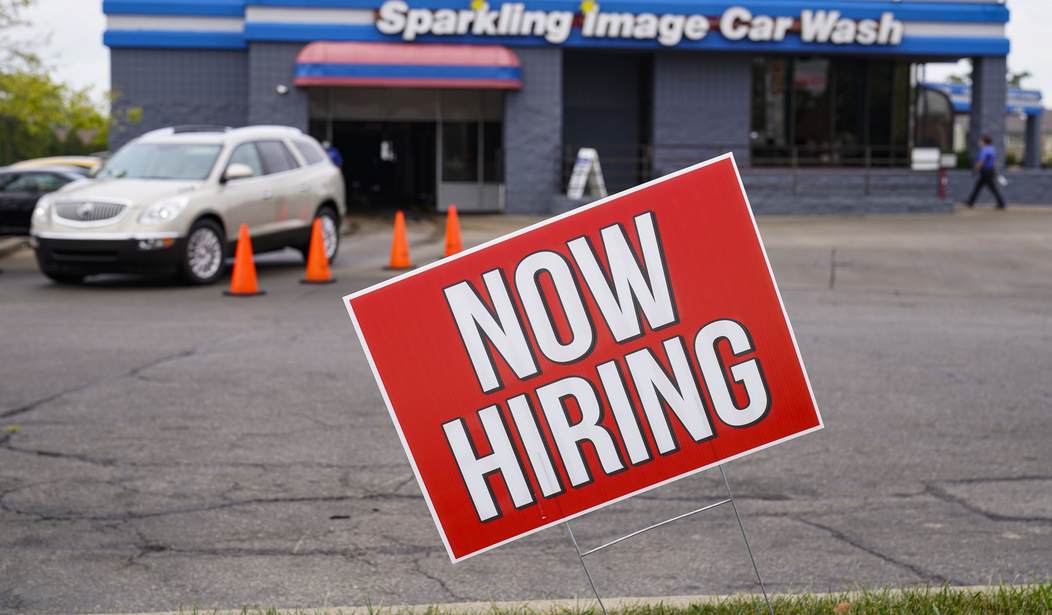The September jobs report is in, and it's a disappointment for the American people and an embarrassment for the Biden administration - or it would be if they were capable of being embarrassed.
The U.S. economy added 89,000 private-sector jobs in September, according to payroll firm ADP. Economists polled by Dow Jones were expecting nearly double that amount at 160,000 jobs.
Numbers for August were revised up to 180,000 jobs added to the economy.
“We are seeing a steepening decline in jobs this month,” Nela Richardson, chief economist for ADP, said in a statement. “Additionally, we are seeing a steady decline in wages in the past 12 months.”
Let's dig into some of these numbers just a bit.
Leisure and hospitality jobs drove the gains in September, adding 92,000 jobs, while transportation jobs decreased by 13,000 and business services jobs dropped by 32,000.
Broken down by business size, small and medium-sized businesses added 167,000 jobs, while large companies shed 83,000 jobs on the month.
Note that last bit; small and medium-sized businesses are adding (a disappointing number of) jobs, while large companies are shedding employees. Also, the bright spot - such as it is - is in leisure and hospitality. More on that in a moment.
With about 6.38 million people looking for a job in the U.S. in August, the ratio of open jobs to job-seekers hit 1.5, a number that still favors workers. That’s down slightly from 1.52 in July, according to the latest numbers from the Labor Department.
That's a brighter note, but it's also curious as to how, in a country where inflation is still slamming consumers, there are this many jobs per worker available. One could quite likely find the answer above, where we see the one area driving September gains: Leisure and hospitality. Those, traditionally, are not high-paying jobs; they are not jobs that deliver generous benefits to employees.
The manufacturing sector has been, traditionally, a sector that delivers good-paying jobs with more generous benefits, and it's the manufacturing sector, in the post-COVID world, that is struggling to re-shore and recover.
This isn't what a soft landing looks like, as my colleague Joe Cunningham informed us Wednesday morning.
In a recent article, another colleague, Mike Miller, reported on a Gallup survey showing that their poll sample favored the GOP over the Democrats on a variety of pressing issues, not least of which is the economy. The summary of that piece says:
- Fifty-three percent of Americans believe the Republican Party will do a better job of keeping the country prosperous over the next few years, whereas 39% choose the Democratic Party.
- A slightly larger majority, 57%, have greater faith in the Republican Party to protect the country from international terrorism and military threats, while 35% favor the Democrats.
- Fifty-three percent of people believe the Republican Party will do a better job of keeping the country prosperous over the next few years, whereas 39% choose the Democratic Party.
- The Republican Party has led on this measure in all but two readings in the trend originating in 2002, but today’s margin is one of the widest in that more limited stretch of time.
This is an advantage the GOP can press, certainly, but they shouldn't muster up too much hubris; these are numbers that favor Republicans in the 2024 election, but they will have to follow through vigorously, and the best way to do that? Cut spending. Cut regulations. Get the government out of the way. The private sector, not the government, is what drives growth. The government (just to belabor the obvious for a moment) cannot create, it can only take and redistribute, soaking up a great deal of the private sector's resources in the process.
If we are to have lasting prosperity in the United States, the government needs to stay out of the way of creators - and I don't mean actors, singers, painters, and writers. I mean the people who create new products and services, people who innovate, people who create new products and new services that people are willing to pay for. The government does not create jobs; innovators and entrepreneurs create jobs. A mature company like John Deere or Ford Motors doesn't generate many new jobs; their workforce is pretty stable. But an entrepreneur might start in his garage, then hire two employees the second year, ten the third, and a hundred the fourth - this is where job growth comes from. In my life, I've worked for a fair number of start-ups, and I've seen this happen first-hand. This is how the economy grows. And this is the only way we'll ever get out of the current spending and debt crisis if it isn't already too late.














Join the conversation as a VIP Member